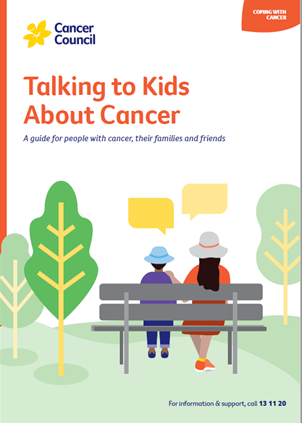- Home
- About Cancer
- Family and friends
- Talking to kids about cancer
- Talking about the diagnosis
- How can I prepare?
How can I prepare?
| Finding the right words | Parents often doubt their ability to find the right words and to answer the questions their children may ask. It’s not a matter of “getting it right”, rather it’s doing the best that you can at a challenging time. |
| Plan and practise | Take the time to plan what you’ll say. Role-playing the conversation with your partner, friend, relative, counsellor, or hospital social worker can help. |
| Practise saying difficult phrases | You may find it helpful to say certain phrases out loud before talking to your children. For example, you might practise saying “I have cancer” or “Grandma has cancer”. This means you’ve spoken the words and perhaps dealt with some of the anxiety attached to those words before you talk with your kids. You can also practise the conversation in front of a mirror. This helps set the words in your mind. |
| Be ready for questions and reactions | Even if you practise what to say and you think you know how your kids will respond, be prepared for questions and a wide range of reactions. |
| Ending the conversation | Before talking to your children, think about how the conversation might end. You could organise an activity, such as playing a game or going to the park, to help your children settle again. |
| Supporting older children | Older children may prefer some time alone, or you may suggest watching a TV show or movie together. Let your kids know that they can talk to you any time they have questions or concerns. |
When things don’t go to plan
There is no “right” way to tell your children about a cancer diagnosis. If you end up blurting out the news or your child reacts differently to how you expected, don’t worry. There will be many conversations over time, and this is just one of them. Your children are unlikely to be affected by one discussion that doesn’t go exactly to plan.
Your child may even react in a way that causes hurt or offence. If this happens, remember that children may not react with feelings of sadness straightaway. They may need time to understand what is being said, and how serious it is. If you are feeling hurt or offended, try to process these feelings away from your child.
Remind your child that they can ask questions or talk to you about their concerns at any time.
→ READ MORE: What do children need to know?
The most important thing is honesty. Tell the truth, don’t sugar-coat, don’t be too over the top. Admit that it’s not going to be a walk in the park, but you’re not going to die tomorrow. The main thing is to be real.
IZZY, AGED 15
Podcast: Explaining Cancer to Kids
Listen to more episodes from our podcast for people affected by cancer
More resources
Prof Jane Turner AM, International Psycho-Oncology Society President Emeritus,The University of Queensland, QLD; Taylor Baker, Consumer; Dr Ben Britton, Principal Clinical and Health Psychologist, Head of Psychology, Hunter New England Mental Health, NSW; Camp Quality; Dr Lisa Cuddeford, Head of Department, WA Paediatric Palliative Care Service, Perth Children’s Hospital, WA; A/Prof Peter Downie, Head, Paediatric Haematology–Oncology and Director, Children’s Cancer Centre, Monash Children’s Hospital, VIC; Dr Sarah Ellis, Clinical Psychologist, Kids Cancer Centre, Sydney Children’s Hospital, NSW; Malia Emberson-Lafoa’i, Consumer; Kate Fernandez, 13 11 20 Consultant, Cancer Council SA; Jane Gillard, Consumer; Mary McGowan OAM, International Childhood Cancer Advocate, VIC; Annette Polizois, Senior Social Worker, Women, Family and Emergency Care Team, Royal North Shore Hospital, NSW; Rhondda Rytmeister, Clinical Psychologist, HeadWayHealth (formerly Snr Clinical Psychologist, The Cancer Centre for Children, Westmead, NSW); Nadine Street, Head of Social Work and Social Welfare, HNE Mental Health Service, NSW; Warren Summers, Online Counsellor, Canteen, NSW.
We would also like to thank the health professionals, consumers, organisations and editorial teams who have worked on previous editions of this title, and we are grateful to the parents and young people whose real-life stories have added to the richness and relevance of this book.
We thank and acknowledge Dr Paula K. Rauch, MD, Founder and Director, Marjorie E. Korff PACT (Parenting At a Challenging Time) Program and Associate Professor of Psychiatry, Harvard Medical School, whose research and writing on helping parents talk to their children about cancer was used as source material for this book and has been adapted in several sections: pages 8–11, How children understand cancer; page 22, Answering key questions: Are you going to die?; page 26, Involving the school or preschool; pages 30–31, Hospital visits; and pages 36–37, Encouraging family time. We also thank the American Cancer Society for permission to use and adapt material on pages 8-11 from its book Cancer in Our Family: Helping children cope with a parent’s illness (2013); Macmillan Cancer Support for permission to use its book Talking to Children and Teenagers When an Adult Has Cancer (2013) as a source of information; Jessica Watt, Oncology Social Worker, The Children’s Hospital at Westmead, for her contribution on page 20, When another child has cancer; and Diane McGeachy, Hobart Counselling Centre, for contributing material for page 37, Spending one-on-one time.
View the Cancer Council NSW editorial policy.
View all publications or call 13 11 20 for free printed copies.

